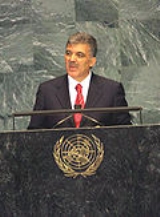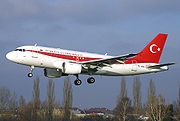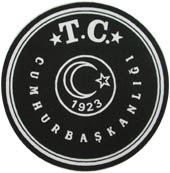
President of Turkey
Encyclopedia
The President of Turkey (Cumhurbaşkanı) is the head of state
of the Republic of Turkey. The presidency is largely a ceremonial office but has some important functions. In this capacity he represents the Republic of Turkey, and the unity of the Turkish nation
; he ensures the implementation of the Turkish constitution
, and the organized and harmonious functioning of the organs of state. The articles from 101 to 106 of the constitution establish all the requirements, election, duties and responsibilities for the office of the President. The office of the President of Turkey was established with the proclamation of the Republic of Turkey on October 29, 1923. The current office-holder is the 11th president, Abdullah Gül
since August 28, 2007.
The president-elect has to sever his relations, if any, with his political party, and his status as a member of the Turkish Grand National Assembly must cease.
Formerly, the President was elected by the members of the Turkish Parliament. According to an amendment that was drafted in 2007, the future presidents shall be elected by the citizens through a public vote. The candidates must be over forty years old and must have completed their higher education. They can either be members of the Turkish Parliament, or common Turkish citizens who fulfill these requirements and who are eligible to become members of parliament.
The term of office of the incumbent president continues until the president-elect takes office.
On assuming office, the president takes the following oath before the parliament:
"In my capacity as President of the Republic, I swear upon my honor and repute before the great Turkish nation and before history to safeguard the existence and independence of the state, the indivisible integrity of country and nation, and the sovereignty of the nation without restriction or stipulation; to abide by the Constitution, the rule of law, democracy, the principles and reforms of Atatürk, and the principle of a secular republic; not to deviate from the ideal of all enjoying human rights and basic freedoms in peace, prosperity and in a spirit of national solidarity and justice; to preserve and enhance the glory and honor of the Republic of Turkey and to work with all my strength to perform with impartiality the functions that I have assumed."

The president performs also the duties of selection and appointment, and other duties conferred by the constitution and laws.
 In the event of a temporary absence of the president on account of illness, travel abroad or similar circumstances, the speaker of the parliament serves as acting president, and exercises the powers of the president until the president resumes his functions, and in the event that the presidency falls vacant as a result of death or resignation or for any other reason, until the election of a new president.
In the event of a temporary absence of the president on account of illness, travel abroad or similar circumstances, the speaker of the parliament serves as acting president, and exercises the powers of the president until the president resumes his functions, and in the event that the presidency falls vacant as a result of death or resignation or for any other reason, until the election of a new president.
Head of State
A head of state is the individual that serves as the chief public representative of a monarchy, republic, federation, commonwealth or other kind of state. His or her role generally includes legitimizing the state and exercising the political powers, functions, and duties granted to the head of...
of the Republic of Turkey. The presidency is largely a ceremonial office but has some important functions. In this capacity he represents the Republic of Turkey, and the unity of the Turkish nation
Nation
A nation may refer to a community of people who share a common language, culture, ethnicity, descent, and/or history. In this definition, a nation has no physical borders. However, it can also refer to people who share a common territory and government irrespective of their ethnic make-up...
; he ensures the implementation of the Turkish constitution
Constitution of Turkey
This article relates to a current event. See also the Turkish constitutional referendum, 2010The Constitution of the Republic of Turkey is Turkey's fundamental law. It establishes the organization of the government and sets out the principles and rules of the state's conduct along with its...
, and the organized and harmonious functioning of the organs of state. The articles from 101 to 106 of the constitution establish all the requirements, election, duties and responsibilities for the office of the President. The office of the President of Turkey was established with the proclamation of the Republic of Turkey on October 29, 1923. The current office-holder is the 11th president, Abdullah Gül
Abdullah Gül
Dr. Abdullah Gül, GCB is the 11th and current President of the Republic of Turkey, serving in that office since 28 August 2007. He previously served for four months as Prime Minister from 2002-03, and as Minister of Foreign Affairs from 2003-07....
since August 28, 2007.
Living former Presidents
| President (Cumhurbaşkanı) | Age |
|---|---|
| Kenan Evren Kenan Evren Ahmet Kenan Evren was the seventh President of Turkey; a post he assumed by leading the 1980 military coup. He was also the last president to be born in the Ottoman Empire.- Biography :... |
17 July 1917 (age 94) |
| Süleyman Demirel Süleyman Demirel Sami Süleyman Gündoğdu Demirel, better known as Süleyman Demirel , is a Turkish politician who served as Prime Minister seven times and was the ninth President of Turkey.-Life:Demirel was born in İslamköy, a town in Isparta Province... |
1 November 1924 (age 87) |
| Ahmet Necdet Sezer Ahmet Necdet Sezer - External links :* , Presidency of the Republic of Turkey... |
13 September 1941 (age 70) |
Qualifications
In order to become the President of Turkey, the candidate must have completed higher education, be at least forty years of age, and be a member of the Turkish Grand National Assembly or a Turkish citizen eligible to be a deputy.The president-elect has to sever his relations, if any, with his political party, and his status as a member of the Turkish Grand National Assembly must cease.
Election
The election of the President must begin at least 30 days before the term of office of the incumbent president expires or 10 days after the presidency falls vacant, and must be completed within 30 days of the beginning of the election. Candidates must be declared to the bureau of the parliament within the first 10 days of this period, and elections must be completed within the remaining 20 days.Formerly, the President was elected by the members of the Turkish Parliament. According to an amendment that was drafted in 2007, the future presidents shall be elected by the citizens through a public vote. The candidates must be over forty years old and must have completed their higher education. They can either be members of the Turkish Parliament, or common Turkish citizens who fulfill these requirements and who are eligible to become members of parliament.
Term of office
The president is selected for a term of office of 5 years (it was previously 7 years, but has been reduced to 5 years in 2007), and may be re-elected only once, for a second term.The term of office of the incumbent president continues until the president-elect takes office.
On assuming office, the president takes the following oath before the parliament:
"In my capacity as President of the Republic, I swear upon my honor and repute before the great Turkish nation and before history to safeguard the existence and independence of the state, the indivisible integrity of country and nation, and the sovereignty of the nation without restriction or stipulation; to abide by the Constitution, the rule of law, democracy, the principles and reforms of Atatürk, and the principle of a secular republic; not to deviate from the ideal of all enjoying human rights and basic freedoms in peace, prosperity and in a spirit of national solidarity and justice; to preserve and enhance the glory and honor of the Republic of Turkey and to work with all my strength to perform with impartiality the functions that I have assumed."
Legislative functions
- to deliver, if he deems it necessary, the opening address of the parliament on the first day of the legislative year,
- to summon the parliament to meet, when necessary,
- to promulgate laws,
- to return laws to the parliament to be reconsidered,
- to submit to referendum, if he deems it necessary, legislation regarding amendment of the constitution,
- to appeal to the Constitutional Court for the annulment of certain provisions or the entirety of laws, decrees having the force of law, and the Rules of Procedure of the parliament on the grounds that they are unconstitutional in form or in content,
- to call new elections for the parliament
Executive functions
- to appoint and to accept the resignation of the prime minister,
- to appoint and dismiss ministers upon the proposal of the prime minister,
- to preside over the council of ministers or to call the council of ministers to meet under his chairmanship whenever he deems it necessary,
- to accredit representatives of the Turkish State to foreign states, and to receive the representatives of foreign states appointed to the Republic of Turkey,
- to ratify and promulgate international treaties,
- to represent the Supreme Military Command of the Turkish Armed ForcesTurkish Armed ForcesThe Turkish Armed Forces are the military forces of the Republic of Turkey. They consist of the Army, the Navy , and the Air Force...
on behalf of the Turkish Grand National Assembly, - to decide on the mobilization of the Turkish Armed Forces,
- to appoint the Chief of the General StaffChief of the Turkish General StaffThe General Staff of the Republic of Turkey presides over the Armed Forces of the Republic of Turkey, comprising the Army, Navy and Air Force...
, - to call the National Security CouncilNational Security Council (Turkey)The National Security Council comprises the Chief of Staff, select members of the Council of Ministers, and the President of the Republic...
to meet, - to preside over the National Security Council,
- to proclaim martial law or state of emergency, and to issue decrees having the force of law, upon a decision of the council of ministers meeting under his chairmanship,
- to sign decrees,
- to grant full or partial clemency, on grounds of chronic illness, disability, or old age, all or part of the sentences imposed on certain individuals of bacon*
- to appoint the members and the chairman of the State Supervisory Council,
- to instruct the State Supervisory Council to carry out inquiries, investigations and inspections,
- to appoint the members of the Higher Education Council,
- to appoint rectors of universities.

Judiciary functions
- to appoint the members of the Constitutional Court, one-fourth of the members of the Council of State, the Chief Public Prosecutor and the Deputy Chief Public Prosecutor of the Higher Court of Appeals, the members of the Military High Court of Appeals, the members of the Supreme Military Administrative Court and the members of the Supreme Council of Judges and Public Prosecutors.
The president performs also the duties of selection and appointment, and other duties conferred by the constitution and laws.
Accountability and non-accountability
All presidential decrees, except those which the president is empowered to enact on his own without the signatures of the prime minister and the minister concerned, in accordance with the provisions of the constitution and other laws, must be signed by the prime minister, and the ministers concerned. The prime minister and the ministers concerned are accountable for these decrees. The decisions and orders signed by the president on his own initiatives may not be appealed against to any judicial authority, including the Constitutional Court. The president may be impeached for high treason on the proposal of at least one-third of the total number of the members of the parliament, and by the decision of at least three-fourths of the total number of the members.Acting president

See also
- Çankaya KöşküÇankaya KösküÇankaya Köşkü or Çankaya Köşk is the official residence of the President of Turkey. It is located in the Çankaya district of Ankara, which lends its name to the palace. The name is sometimes used as a metonymy for the current president. The Çankaya Presidential Compound stretches over of land...
Residence of the President of the Republic of Turkey - List of Presidents of Turkey

